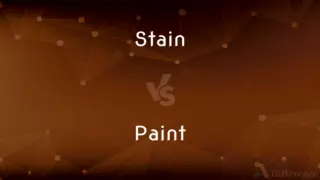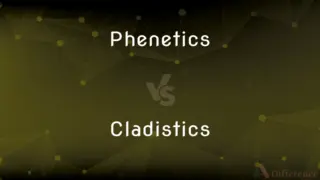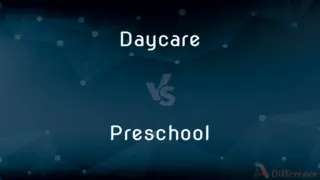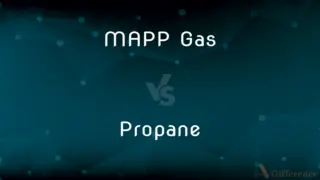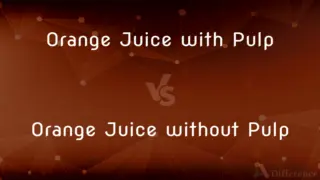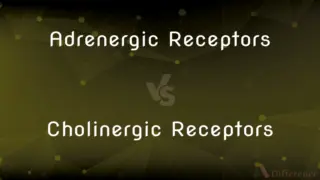Agriculture vs. Cultivation — What's the Difference?
By Tayyaba Rehman & Fiza Rafique — Updated on April 23, 2024
Agriculture encompasses the entire process of crop production for human use and trade, while cultivation specifically refers to the act of preparing and working the soil.

Difference Between Agriculture and Cultivation
Table of Contents
ADVERTISEMENT
Key Differences
Agriculture is a broad sector that includes the cultivation, processing, and distribution of crops and livestock products. Whereas cultivation is specifically the process of tilling the soil, planting seeds, and growing edible plants.
Agriculture involves various practices beyond just cultivation, such as breeding, harvesting, and marketing of products. On the other hand, cultivation is a critical component of agriculture focused solely on the growing phase of plant life.
In agriculture, technological advancements play a significant role in improving productivity and sustainability. In contrast, cultivation techniques may remain more traditional or might incorporate modern methods depending on the agricultural practices.
Agriculture often requires a holistic understanding of ecosystems to manage crops and livestock effectively. Conversely, cultivation requires knowledge primarily about soil health and plant care.
Agriculture's aim often includes economic profitability and meeting global food demands. However, cultivation is more narrowly focused on the effective growing of specific crops.
ADVERTISEMENT
Comparison Chart
Definition
The science, art, and business of cultivating soil, growing crops, and raising livestock.
The act of preparing land and growing crops by tilling, sowing, and managing plants.
Scope
Broad, encompassing cultivation, breeding, and marketing.
Narrow, focusing solely on growing plants.
Primary Focus
Includes animal husbandry, crop production, and technology integration.
Primarily concerned with soil management and plant growth.
Technological Involvement
Often involves advanced technologies for efficiency and scale.
May use simple tools to advanced machinery, focusing mainly on plant care.
Economic Impact
Driven by profitability and large-scale production.
Mainly focused on the yield and quality of specific crops.
Compare with Definitions
Agriculture
A field that integrates science, technology, and management to produce and distribute food and goods.
Advances in agriculture have significantly increased crop yields.
Cultivation
The care given to plants during their growth.
Regular cultivation ensures healthy crop growth.
Agriculture
The systematic breeding and care of livestock.
Modern agriculture often includes sophisticated livestock management systems.
Cultivation
The act of preparing the land for growing crops.
Cultivation of the land is the first step in the farming season.
Agriculture
The environmental management of farming practices.
Sustainable agriculture seeks to balance production with environmental health.
Cultivation
The process of trying to acquire or develop a quality or skill.
Cultivation of a good work ethic is essential in any profession.
Agriculture
The practice of farming, including cultivation of the soil for the growing of crops and the rearing of animals to provide food, wool, and other products.
Agriculture is vital for sustaining populations and economies.
Cultivation
A method of tilling soil and growing plants.
Different cultivation techniques are required for various types of crops.
Agriculture
The activities concerned with the processing and sale of agricultural products.
Agriculture today involves more than just planting and harvesting.
Cultivation
The improvement of plant growth by labor and attention.
Proper cultivation can significantly increase crop yields.
Agriculture
Agriculture is the practice of cultivating plants and livestock. Agriculture was the key development in the rise of sedentary human civilization, whereby farming of domesticated species created food surpluses that enabled people to live in cities.
Cultivation
The act of cultivating.
Agriculture
The science, art, and business of cultivating soil, producing crops, and raising livestock; farming.
Cultivation
The state of being cultivated.
Agriculture
The art or science of cultivating the ground, including the harvesting of crops, and the rearing and management of livestock
Cultivation
Refinement; culture.
Agriculture
The art or science of cultivating the ground, including the harvesting of crops, and the rearing and management of live stock; tillage; husbandry; farming.
Cultivation
The art or act of cultivating; improvement of land for or by agriculture
The heavy cultivation of the hillside led to soil erosion.
Agriculture
A large-scale farming enterprise
Cultivation
The state of being cultivated or used for agriculture
These fields are in cultivation.
Agriculture
The practice of cultivating the land or raising stock
Cultivation
Devotion of time or attention to the improvement of (something)
His steadfast cultivation of their relationship finally bore fruit.
Agriculture
The federal department that administers programs that provide services to farmers (including research and soil conservation and efforts to stabilize the farming economy); created in 1862
Cultivation
Advancement or refinement in physical, intellectual, or moral condition
She is a woman of great cultivation.
Agriculture
The class of people engaged in growing food
Cultivation
The art or act of cultivating; improvement for agricultural purposes or by agricultural processes; tillage; production by tillage.
Cultivation
Bestowal of time or attention for self-improvement or for the benefit of others; fostering care.
Cultivation
The state of being cultivated; advancement in physical, intellectual, or moral condition; refinement; culture.
Italy . . . was but imperfectly reduced to cultivation before the irruption of the barbarians.
Cultivation
Socialization through training and education
Cultivation
(agriculture) production of food by preparing the land to grow crops
Cultivation
A highly developed state of perfection; having a flawless or impeccable quality;
They performed with great polish
I admired the exquisite refinement of his prose
Almost an inspiration which gives to all work that finish which is almost art
Common Curiosities
How do farmers decide between different cultivation methods?
Farmers choose cultivation methods based on soil type, climate, crop choice, and available technology and resources.
What skills are necessary for effective cultivation?
Skills such as soil analysis, plant biology, and water management are crucial for effective cultivation.
What are the key components of agriculture?
Agriculture involves cultivation, animal husbandry, pest management, harvesting, and marketing of farm products.
What role does cultivation play in sustainable agriculture?
Cultivation practices are central to sustainable agriculture, aiming to maintain soil health, reduce water usage, and minimize chemical inputs.
How has cultivation evolved over the centuries?
Cultivation has evolved from manual labor to the use of plows and now to mechanized equipment and genetically modified crops.
What is the impact of climate change on agriculture and cultivation?
Climate change affects agriculture and cultivation by altering weather patterns, water availability, and increasing the prevalence of pests and diseases.
What are the financial considerations for starting in agriculture vs. just cultivation?
Starting in agriculture generally requires a larger financial investment due to the need for diverse resources and equipment, while starting solely with cultivation might be less costly, focusing mainly on crop production.
What are some modern tools used in cultivation?
Modern tools in cultivation include automated tractors, drip irrigation systems, and precision farming technology.
How does cultivation affect the environment?
Cultivation can impact the environment through soil erosion, use of water resources, and effects on local flora and fauna, depending on the methods used.
Can agriculture exist without cultivation?
While cultivation is a core aspect of agriculture, agriculture also includes activities like aquaculture and agroforestry that do not involve traditional soil cultivation.
What educational paths are available for learning about agriculture and cultivation?
Educational paths include agricultural science degrees, vocational training in horticulture or soil science, and certifications in organic farming practices.
How does urban agriculture differ from traditional agricultural practices?
Urban agriculture typically involves smaller-scale cultivation practices, often using vertical farming or hydroponics, unlike traditional agriculture's large-scale, rural farming.
What are common challenges faced in agriculture that are not as prevalent in cultivation?
Challenges unique to broader agriculture include supply chain issues, market price fluctuations, and managing livestock diseases, which are not concerns of cultivation alone.
How do governmental policies affect agriculture and cultivation?
Government policies can influence agriculture and cultivation through subsidies, tariffs, environmental regulations, and support for research and development.
How do consumer preferences impact agriculture and cultivation practices?
Consumer demand for organic, locally-sourced, and non-GMO products has led to changes in both agriculture and cultivation practices to meet these preferences.
Share Your Discovery

Previous Comparison
Beard vs. Mustache
Next Comparison
Freight vs. CartageAuthor Spotlight
Written by
Tayyaba RehmanTayyaba Rehman is a distinguished writer, currently serving as a primary contributor to askdifference.com. As a researcher in semantics and etymology, Tayyaba's passion for the complexity of languages and their distinctions has found a perfect home on the platform. Tayyaba delves into the intricacies of language, distinguishing between commonly confused words and phrases, thereby providing clarity for readers worldwide.
Co-written by
Fiza RafiqueFiza Rafique is a skilled content writer at AskDifference.com, where she meticulously refines and enhances written pieces. Drawing from her vast editorial expertise, Fiza ensures clarity, accuracy, and precision in every article. Passionate about language, she continually seeks to elevate the quality of content for readers worldwide.
















